| ||||
| ||||
| ||||
The 2024 University of Oxford election for the position of Chancellor became necessary upon the resignation of the incumbent Chancellor, Chris Patten, to take effect at the end of the Trinity term of 2024.
| ||||
| ||||
| ||||
The 2024 University of Oxford election for the position of Chancellor became necessary upon the resignation of the incumbent Chancellor, Chris Patten, to take effect at the end of the Trinity term of 2024.

Patten had been elected as Chancellor of the University of Oxford in March 2003. In February 2024, he announced in a letter to the Vice-Chancellor of the university, Irene Tracey, that he would retire as Chancellor at the end of the academic year, after twenty-one years in post. [1]
In resigning, Patten quoted from the University of Oxford's statutes of 2002: "the Chancellor shall be elected by Convocation and shall hold office during his or her life or until his or her resignation." [1]
To stand for election, a candidate needs to be nominated by fifty members of the university's Convocation. The election of 2024 will be the first to take place on the Internet. At all previous elections, ballots needed to be cast in person in Oxford. [2] [3]
Apart from the basic rules established by its Statutes, the university has stated that "The process and timetable for the election of the Chancellor by members of the University's Convocation will be announced in due course." [4] [5]



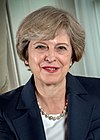


On 7 February 2024, The Daily Telegraph reported that the former Conservative minister Rory Stewart, of Balliol College, had emerged as front runner in the election with the bookmaker William Hill. [2] By chance, Chris Patten and his two predecessors, Harold Macmillan and Roy Jenkins, were also Balliol men. [6]
Other potential candidates have been reported as former British prime ministers Theresa May, Tony Blair, and Boris Johnson, former prime minister of Pakistan Imran Khan, [7] who is also a former Chancellor of the University of Bradford, [8] and Elish Angiolini, Principal of St Hugh's College, Oxford, a pro-vice-chancellor of the University and chair of the Angiolini Inquiry. [2] [9] All of these are members of the University of Oxford, [7] [2] although this qualification is not strictly required, and in principle anyone can be nominated. [2]
On 7 February 2024, William Hill had Stewart favourite in the betting odds at 5/6, May at 7/4, Blair at 4/1, Johnson at 13/2, and Imran Khan at 10/1. [10]
On 5 March 2024, the Evening Standard reported that a number of academics were considering supporting Angiolini as an alternative to Stewart, noting that she was not a politician and that she would be the first woman ever to hold the post. At this point, Stewart had not announced definitely that he would stand, but had said "it is a very interesting idea and an amazing role”. [11]
On 22 March 2024, the University announced changes to its regulations governing the election of a new Chancellor, which were to take effect on 5 April 2024. Instead of any candidate being entitled to stand, subject to being nominated by fifty electors, a new Chancellor’s Election Committee will remove nominated candidates from the election process whom it does not consider "suitable". [5]
The Committee will decide the criteria for suitability and may disclose what they are. It will "have due regard to the principles of equality and diversity". [5] [12]
If the Committee finds only one candidate suitable, it may declare that person to be elected unopposed or may choose to re-open the nominations. [5]
If in a contested election the voting is tied, the Chairman of the Committee will decide between the candidates with an equal number of votes. [5] [12]
The members of the Committee are the High Steward, currently Lord Reed of Allermuir, who is designated to chair the Committee ex officio ; the Vice-Chancellor, and other "representatives from across the collegiate University and its council". [5] These are: one person appointed by the University Council from among its external members; two members of the Council appointed by it from among its members; one member of Congregation appointed by the Gardens, Libraries and Museums, University administrative Services, and the Department for continuing Education; one member of Congregation appointed by each of the divisional boards; the early career research staff representative who attends the Council; and the chair of the conference of colleges. The Committee may also co-opt one or two other members. [12]
Neil O'Brien MP, a University graduate and member of Christ Church, commented the same day "A stitch-up in Oxford: with no public discussion the University has decided to move away from democracy when choosing its next Chancellor." [13] [14] An article in The Daily Telegraph the next day quoted his "stitch-up" comment and also an unnamed college don who had told the newspaper he saw the new Committee as an "undemocratic, Politburo-style election approach”. Dr Yuan Zi Zhou, a university lecturer in politics, commented that the changing of the rules "illustrates the control freak tendencies of modern academic managers". The removal of duly nominated candidates was believed to be unprecedented in such elections in the United Kingdom. [15]
On 25 March the Evening Standard quoted an anonymous "senior cabinet minister" as saying "We can’t have a stitch-up. The next chancellor must be selected by the same democratic process as the last one." It reported that "another senior government source", also anonymous, had commented "It is all about this performative obsession with equality and diversity". [16] In a statement the University said:
"The next chancellor will be elected by convocation — the body of university members and alumni — using an online platform. Eligibility will first be checked by the chancellor’s election committee against criteria agreed by council. The committee will be made up of representatives from across the collegiate university and its council." [16]
On 28 March, a letter from Vice-chancellor Irene Tracey appeared in The Times defending the changes and claiming "democracy is alive and well at Oxford". [17]
On 30 March, The Sunday Telegraph claimed to have seen a leaked email showing that the intended purpose of the Committee was "to stop politicians becoming chancellor". Damian Green, the former de facto deputy prime minister and a friend of Theresa May from their days at the University of Oxford, described the criteria as “a momentous and ill-advised change which at the very least should have been consulted on”. [18]
On 16 May, The Times reported that "Oxford University has dropped plans to vet the candidates to become its new chancellor after being accused by ministers of an attempted "stitch up" to prevent another white male politician from getting the job...The change is designed to see off a row with senior government ministers, who attacked the proposals as "wokeism gone mad" and said they were designed to install university officials' preferred candidate." [19] In the same paper, the leader article welcomed the U-turn as "a victory for fairness and common sense." [20]
Until 2024, all Oxford chancellors had been elected for life. A further function given to the new Chancellor's Election Committee is to make a recommendation to the University Council to fix a term of office for the Chancellor. This will need to be decided upon by the Council. [12]
The purpose of this change was stated as "to prevent the coincidence of a newly appointed Vice-Chancellor and a new elected Chancellor." [21]

Christopher Francis Patten, Baron Patten of Barnes, is a British politician who was the 28th and last Governor of Hong Kong from 1992 to 1997 and Chairman of the Conservative Party from 1990 to 1992. He was made a life peer in 2005 and has been Chancellor of the University of Oxford since 2003. He is also one of the two living former governors of Hong Kong with David Wilson.

Theresa Mary, Lady May is a British politician who served as Prime Minister of the United Kingdom and Leader of the Conservative Party from 2016 to 2019. She previously served as Home Secretary from 2010 to 2016. She has been Member of Parliament (MP) for Maidenhead since 1997. May is the second female UK prime minister, after Margaret Thatcher, and the first woman to hold two of the Great Offices of State. Ideologically, May is a one-nation conservative.

Sir David Roy Lidington is a former British politician who was the Member of Parliament (MP) for Aylesbury from 1992 until 2019. A member of the Conservative Party, he served as Chancellor of the Duchy of Lancaster and Minister for the Cabinet Office from 2018 to 2019 and was frequently described as being Theresa May's de facto Deputy Prime Minister.

Philip Hammond, Baron Hammond of Runnymede is a British politician and life peer who served as Chancellor of the Exchequer from 2016 to 2019, Foreign Secretary from 2014 to 2016, and Defence Secretary from 2011 to 2014. A member of the Conservative Party, he was the Member of Parliament (MP) for Runnymede and Weybridge from 1997 to 2019.
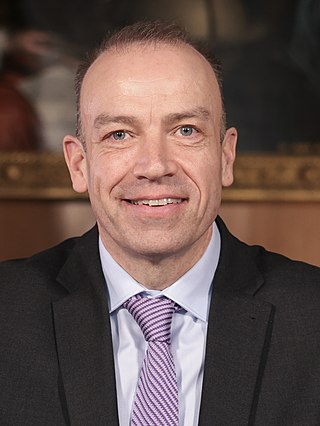
Christopher Heaton-Harris is a British politician who has served as Secretary of State for Northern Ireland since 6 September 2022. A member of the Conservative Party, he has served as the Member of Parliament (MP) for Daventry since 2010.

Sir John Antony Hood is a New Zealand businessman and administrator. He was Vice-Chancellor of the University of Oxford from 5 October 2004 until 30 September 2009. He was the first Vice-Chancellor to be elected from outside Oxford's academic body in 900 years, and the first to have addressed the scholars' congregation via a webcast. In March 2007 New Zealand Prime Minister Helen Clark awarded him the World Class New Zealand supreme award to honour his contribution to profiling New Zealand and New Zealanders internationally. On 15 November 2007 he announced that he would not seek an extension to his five-year term as Vice Chancellor, and that he would leave Oxford in September 2009.

Christopher Laurie "Kit" Malthouse is a British politician and businessman who served as Secretary of State for Education from 6 September to 25 October 2022. A member of the Conservative Party, he previously served as Chancellor of the Duchy of Lancaster from July to September 2022. He has served as Member of Parliament (MP) for North West Hampshire since 2015.

Lady Elish Frances Angiolini is a Scottish lawyer who currently serves as Lord Clerk Register. Angiolini has worked at the University of Oxford since 2012 and has been identified as a potential candidate in the 2024 University of Oxford Chancellor election.
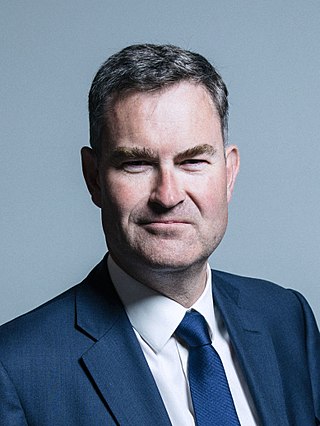
David Michael Gauke is a British political commentator, solicitor and former politician who was the Member of Parliament (MP) for South West Hertfordshire from 2005 to 2019. He served in the Cabinet under Theresa May, most notably as Secretary of State for Justice and Lord Chancellor from 2018 to 2019. First elected as a Conservative, Gauke had the Conservative whip removed on 3 September 2019 and until the dissolution sat as an independent politician.
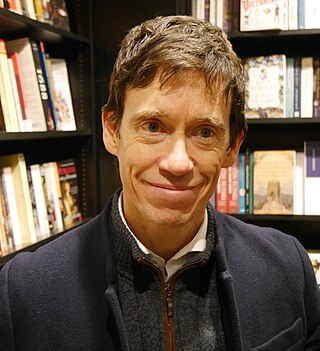
Roderick James Nugent Stewart, known as Rory Stewart, is a British academic, broadcaster, and former diplomat and politician. He is the Brady-Johnson Professor of the Practice of Grand Strategy at Yale University's Jackson School of Global Affairs. He hosts The Rest Is Politics podcast with Alastair Campbell. He served as Member of Parliament (MP) for Penrith and The Border from 2010 to 2019, and between 2015 and 2019 he served as a minister in four departments of the British Government. He then became a Cabinet minister as Secretary of State for International Development from May to July 2019.

Patricia Morris, Baroness Morris of Bolton,, is a British peer and former Shadow Minister for Women and an Opposition Whip for the Conservative Party.

Sir Alec Edward Shelbrooke is a British Conservative politician who has been Member of Parliament for Elmet and Rothwell since 2010. He served as Minister of State for Defence Procurement in the Truss ministry from September to October 2022.

Nadhim Zahawi is an Iraqi-born British politician who served in various ministerial positions under prime ministers Theresa May, Boris Johnson, Liz Truss, and Rishi Sunak from 2018 to 2023. He most recently served as Chairman of the Conservative Party and Minister without Portfolio from 25 October 2022 until he was dismissed by Sunak on 29 January 2023. A member of the Conservative Party, he has been Member of Parliament (MP) for Stratford-on-Avon since 2010.
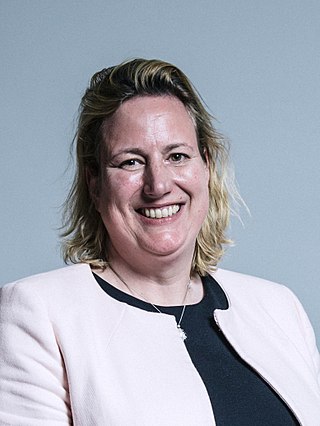
Antoinette Geraldine Mackeson-Sandbach, known as Antoinette Sandbach, is a barrister, farm manager and politician who was elected as a North Wales region Member of the Welsh Assembly at the May 2011 election, and subsequently elected Member of Parliament for Eddisbury in Cheshire at the 2015 general election.

The 2003 University of Oxford election for the position of Chancellor was called upon the death of the incumbent Chancellor, Roy Jenkins, Baron Jenkins of Hillhead, on 5 January 2003.

Victoria Mary Prentis, is a British lawyer who has served as the Attorney General for England and Wales since October 2022. Prentis has served as the Member of Parliament for Banbury since 2015. She is a member of the Conservative Party.
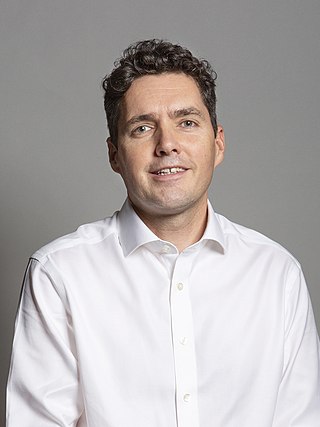
Huw William Merriman is a British politician who has been the Member of Parliament (MP) for Bexhill and Battle in East Sussex since the 2015 general election. A member of the Conservative Party, he has served as Minister of State for Rail and HS2 since October 2022. He previously chaired the Transport Select Committee between January 2020 and October 2022. Prior to his parliamentary career, Merriman was a barrister and a local councillor.

Stephen Parkinson, Baron Parkinson of Whitley Bay is a British Conservative member of the House of Lords who serves as Parliamentary Under-Secretary of State for Arts, Heritage and Libraries since March 2022.
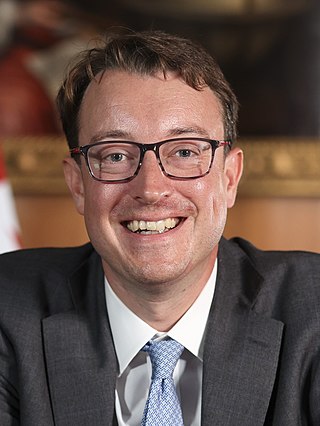
Sir Simon Richard Clarke is a British politician who has been Member of Parliament (MP) for Middlesbrough South and East Cleveland since 2017. A member of the Conservative Party, he briefly served as Secretary of State for Levelling Up, Housing and Communities from September to October 2022 and Chief Secretary to the Treasury from 2021 to 2022.

The 2019 Conservative Party leadership election was triggered when Theresa May announced on 24 May 2019 that she would resign as leader of the Conservative Party on 7 June and as Prime Minister of the United Kingdom once a successor had been elected. Nominations opened on 10 June; 10 candidates were nominated. The first ballot of members of Parliament (MPs) took place on 13 June, with exhaustive ballots of MPs also taking place on 18, 19 and 20 June, reducing the candidates to two. The general membership of the party elected the leader by postal ballot; the result was announced on 23 July, with Boris Johnson being elected with almost twice as many votes as his opponent Jeremy Hunt.